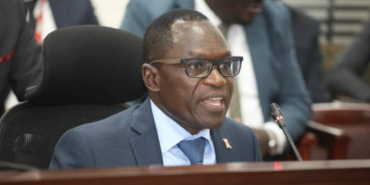CS Ruku: Affordable Housing Key to Preventing Slum Fires in Kenya

The Kenyan government has announced an ambitious affordable housing initiative aimed at transforming informal settlements across the country.
Cabinet Secretary for Public Service, Human Capital Development, and Special Programmes, Geoffrey Ruku, emphasizes the critical need for safer, more resilient housing solutions during recent visits to affected communities in Mukungu, Kibra, and Kimana Market, Kajiado South. The announcement comes in the wake of multiple fire incidents that have highlighted the precarious living conditions within these settlements. Recent fires in Kibra, suspected to have been ignited by an unattended candle, displaced over 300 people.
In Kimana, an electrical fault triggered a blaze that left nearly 100 households without shelter. CS Ruku reaffirms the government's commitment to assisting affected families by ensuring they receive adequate support to rebuild their lives. Proactive measures will be adopted to enhance safety and improve living conditions in informal settlements. The planned affordable housing projects will target Kibra, Mukuru kwa Njenga, Mukuru kwa Reuben, and Korogocho areas particularly vulnerable to fire outbreaks due to overcrowding, inadequate infrastructure, and poor fire safety measures.
The government's approach is underpinned by Executive Order No. 1 of 2025, which establishes a national framework for disaster management. CS Ruku stresses that the Executive Order is a tangible commitment by President William Ruto to safeguard the lives and livelihoods of all Kenyans. This strategy embodies a dual approach: immediate humanitarian assistance and long-term resilience-building. Short-term relief efforts include the provision of food supplies, bedding, and dignity packs for displaced families.
Simultaneously, long-term strategies encompass infrastructure improvements, policy reforms, and comprehensive housing programs designed to alleviate chronic risks. Collaboration between national and local government officials is pivotal in the crisis response efforts. CS Ruku personally led a relief distribution exercise at the Kibra Deputy County Commissioner's office, accompanied by Nairobi Senator Karen Nyamu and Kibra Member of Parliament Peter Ochieng. Executive Order No. 1 of 2025 delegates specific responsibilities to two key state departments within the Ministry of Public Service.
The State Department for Special Programmes oversees disaster preparedness, response, and recovery, coordinating emergency food aid, shelter solutions, strategic food reserves, early warning systems, and community rebuilding efforts. The State Department for Public Service and Human Capital Development focuses on public service reform, human resource management, career development initiatives, and welfare benefits. It supervises crucial institutions such as the Kenya School of Government, Huduma Centres, and the National Youth Service (NYS). The department also plays a role in disaster preparedness by training public servants in emergency response protocols.
CS Ruku emphasizes that a responsive and well-trained public service is essential for effective disaster management. Building institutional capacity within government agencies ensures timely interventions during national emergencies.
Beyond immediate disaster response, the government views affordable housing as a cornerstone of resilience-building. By investing in well-planned housing projects, the government aims to replace unsafe structures with durable, secure homes equipped with essential utilities.
While addressing residents in Kimana, CS Ruku encouraged them to support the Kenya Kwanza administration's ongoing development initiatives. He specifically urged enrollment in the Social Health Authority (SHA) scheme, designed to provide universal health coverage across the country. The planned affordable housing projects signal a shift in Kenya's urban policy. Historically, informal settlements have expanded with minimal regulation, leading to structural vulnerabilities.
The new housing plan aligns with broader urban development strategies that prioritize organized housing schemes, sustainable land use, and improved living standards.








Add new comment